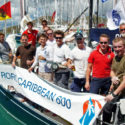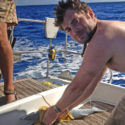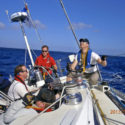Three officers from the Royal Yeomanry took part in the February 2013 Caribbean 600 offshore yacht race as part of a Royal Armoured Corps crew of eleven. The event comprised 50 boats navigating a non-stop 600-mile course from Antigua around the islands of the western Caribbean. Unlike the other crews who were almost universally experienced sailors, we had only four who had ocean sailed before and five of the rest were complete novices.
The first task for the crew upon landing in Antigua was to find and take over our yacht – the 40 ft ‘Patriot’, which was to be both our equipment and our home for the next 9 days. We had hoped to start our training the day after arriving, but the whole expedition was put at risk when damage was discovered by divers who checked the hull and it looked like we’d never leave port.
After two days on tenterhooks as to the fate of the expedition, we finally got the green light and set out for a practice sail. Even heading out for two hours produced some seasickness among the novices on some choppy seas; for one of us it would be 48 hours into the race itself before he could stand to be on deck at all. At this stage the old hands had to do most of the work, because we novices could not tell a sheet from a halliard and were good only for mobile ballast.
The first day of the race found the team in high spirits as we sailed out of Falmouth Harbour, Antigua in the company of the other competitors and headed for the start-line nearby. There was every kind of ocean going sailing boat imaginable, mainly single hulls up to 80ft plus, but also catamarans and trimarans. This was to be the last we saw of the field as our novice-crewed, rather dumpy boat simply couldn’t keep pace with the gleaming arrow-shaped machines around us.
Offshore sailing may not sound like hardwork to everyone, but in contrast to inshore sailing and indeed other adventure training it’s truly unremitting. For six days and nights we were never off our yacht and were always pitching at an angle, usually of 40°. This meant that when off shift, one still only had a 50% chance of a decent sleep as each tack was liable to throw those on the windward side out of their bunks. Cooking was even worse as one had to tie oneself to the cooker; I and Captain Arkell, had plenty of experience at this as we were neither seasick below decks as some were, nor were we experienced enough to steer in the roughest seas. Cooking made the humid cabin even hotter and it was a relief for those off watch to get back on deck.
The Caribbean, normally calm, was uncharacteristically choppy for our week’s sailing and the swells slowed us down more than some of the larger craft. The crew improved through the week and we gradually sailed closer to the wind and faster as we could be relied upon to change sail more quickly; though by the time the seas finally calmed on day 5, we had lost too much ground on the pack to make it up.
We sailed in the last boat on day 6, having missed the finishing party the night before, but our spirits were raised by having a large welcoming committee on the dockside and we tied up amid a lot of fanfares from the other yachts. It transpired that 8 of the 50 had retired so our late finish didn’t seem so bad and we had covered some 800 nautical miles of ocean – tacking had added some 200 miles to the race target.
Taken overall this was a truly challenging trip and all those aboard improved their sailing skills, whether building on previous knowledge or starting from scratch. As a mix of ranks and ages we gelled well together and improved our teamworking skills with people taking their turn at the various tasks from sail-trimming to winching, cooking and steering. Such a voyage would have been impossible in the wintry conditions around Britain in winter and indeed the Caribbean 600 provided a unique racing experience, therefore funds from the Ulysses Trust were crucial to enabling us to fly to the Caribbean where we could learn to sail in a more benign environment.



